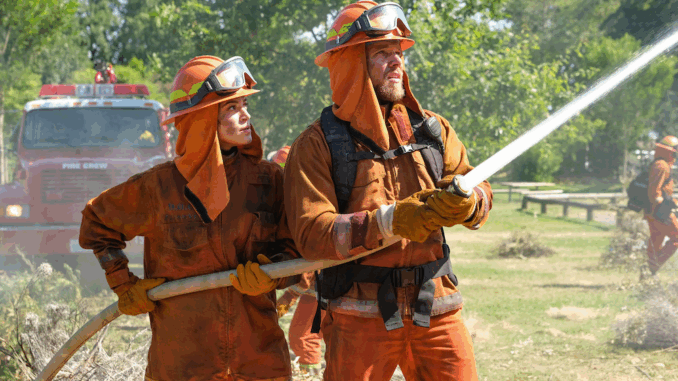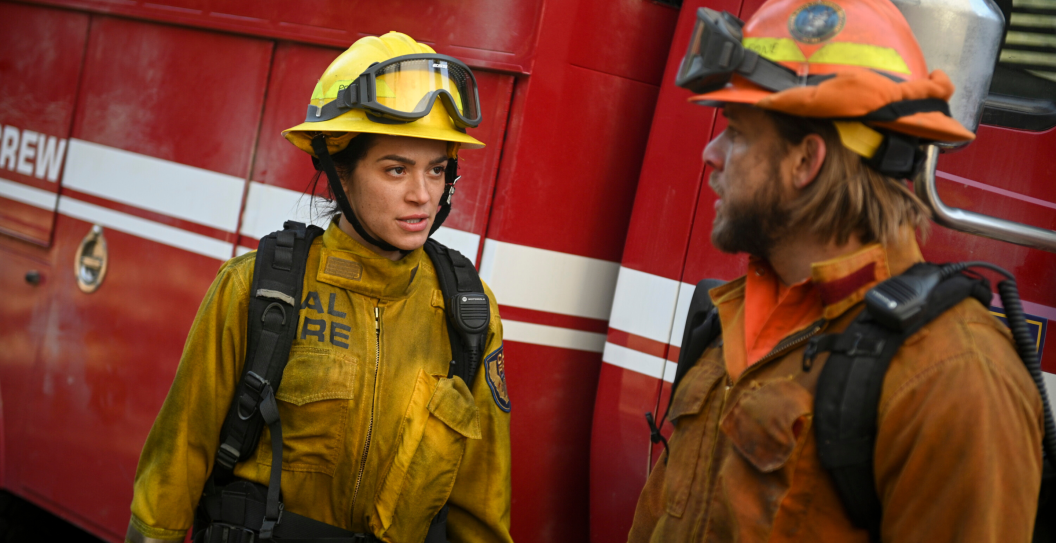
In a show dominated by fire, danger, and raw masculinity, Fire Country does something unexpected—it gives women not only a seat at the table, but puts them at the head of the team. Through characters like Sharon Leone and Gabriela Perez, the series doesn’t just include women in the world of firefighting—it centers them as essential forces of wisdom, leadership, and change.
While much of the spotlight shines on Bode’s personal redemption and Vince’s conflicted fatherhood, Fire Country quietly and powerfully explores how women navigate power, caregiving, and ambition in a world designed to exclude them.
Sharon Leone: A Leader, a Mother, a Fighter
Sharon Leone is the backbone of Fire Country. As a division chief in Cal Fire, she commands respect in a male-dominated profession—but her leadership isn’t built on bravado or physical strength. It’s built on empathy, strategic thinking, and emotional endurance.
What makes Sharon remarkable is how seamlessly she balances two identities that often seem to contradict each other on television: a commanding officer and a devoted mother. She doesn’t sacrifice one role for the other. She holds space for both—disciplining firefighters with authority while supporting her son Bode with love, even when he tests her boundaries.
Her character is especially powerful because she doesn’t fall into common stereotypes of “tough female boss” or “soft maternal figure.” She is both, fully realized and deeply human. She makes hard calls. She breaks down in private. She holds the line when others falter.
And when facing her own health crisis—a life-threatening kidney condition—Sharon’s resilience becomes even more evident. Her body may be vulnerable, but her spirit is indomitable. In this way, Fire Country shows that true strength isn’t about invincibility—it’s about endurance in the face of fear.
Gabriela Perez: Grace Under Fire

If Sharon represents wisdom and legacy, Gabriela Perez embodies new blood, fresh perspective, and the challenges of being a young woman in a dangerous profession.
Gabriela is not just a firefighter—she’s an elite athlete, a paramedic, and a deeply compassionate soul who chooses service over safety. As the daughter of a respected fire captain and the love interest of Bode Donovan, Gabriela constantly navigates personal and professional tensions.
What makes her character compelling is how she refuses to be defined by romance or male attention. Her connection with Bode is tender and layered, but it never overshadows her own ambitions or self-worth. Gabriela stands on her own feet, sometimes literally carrying the weight of a victim out of a burning building.
She’s also one of the few characters in the show who consistently brings a moral clarity to chaotic situations. Whether it’s calling out injustice, helping a fellow firefighter manage trauma, or risking her life in the field, Gabriela radiates a quiet kind of bravery that redefines what heroism can look like.
Challenging Gender Stereotypes
Fire Country doesn’t treat its female characters as anomalies in a man’s world—it treats them as essential parts of the team. The show avoids common pitfalls of making women either emotionless or overly fragile. Instead, it offers something rare: complex, capable women who are shaped by their environment but never erased by it.
Sharon’s authority isn’t questioned because she’s a woman—it’s respected because she’s the best. Gabriela’s skills aren’t undermined—they’re celebrated. The men in the series aren’t threatened by their presence—they’re often inspired by it.
This is a subtle but significant shift in storytelling. It doesn’t just “include” women—it builds a narrative around their strength.
Sisterhood in the Firehouse
Though Fire Country focuses heavily on Sharon and Gabriela, it also plants seeds for future female relationships and mentorships. Gabriela’s admiration for Sharon hints at an important theme: legacy isn’t just passed from father to son—it’s passed from woman to woman, too.
This intergenerational dynamic of women in leadership, especially in a high-risk field like firefighting, offers a refreshing and necessary look at how female mentorship can thrive in pressure-cooker environments.
Why It Matters
Representation matters. In an industry where male firefighters dominate both real-life ranks and television screens, Fire Country offers a counter-narrative. It tells viewers—especially young women—that there is a place for them in leadership, in service, and in spaces where courage is currency.
By writing women like Sharon and Gabriela not just as side characters but as architects of the story, Fire Country does more than entertain—it reshapes how we see power, compassion, and leadership.
